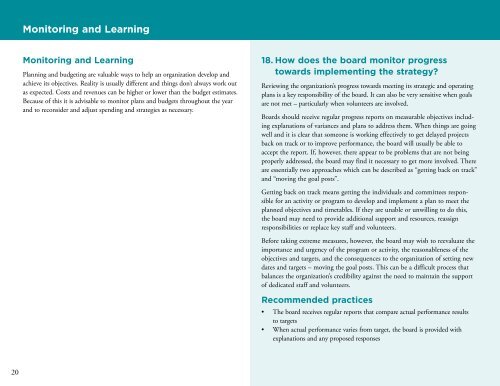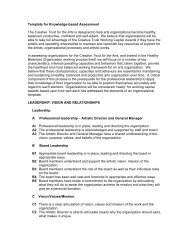20 Questions - Canadian Institute of Chartered Accountants
20 Questions - Canadian Institute of Chartered Accountants
20 Questions - Canadian Institute of Chartered Accountants
You also want an ePaper? Increase the reach of your titles
YUMPU automatically turns print PDFs into web optimized ePapers that Google loves.
Monitoring and Learning<br />
Monitoring and Learning<br />
Planning and budgeting are valuable ways to help an organization develop and<br />
achieve its objectives. Reality is usually different and things don’t always work out<br />
as expected. Costs and revenues can be higher or lower than the budget estimates.<br />
Because <strong>of</strong> this it is advisable to monitor plans and budgets throughout the year<br />
and to reconsider and adjust spending and strategies as necessary.<br />
18. How does the board monitor progress<br />
towards implementing the strategy?<br />
Reviewing the organization’s progress towards meeting its strategic and operating<br />
plans is a key responsibility <strong>of</strong> the board. It can also be very sensitive when goals<br />
are not met – particularly when volunteers are involved.<br />
Boards should receive regular progress reports on measurable objectives including<br />
explanations <strong>of</strong> variances and plans to address them. When things are going<br />
well and it is clear that someone is working effectively to get delayed projects<br />
back on track or to improve performance, the board will usually be able to<br />
accept the report. If, however, there appear to be problems that are not being<br />
properly addressed, the board may find it necessary to get more involved. There<br />
are essentially two approaches which can be described as “getting back on track”<br />
and “moving the goal posts”.<br />
Getting back on track means getting the individuals and committees responsible<br />
for an activity or program to develop and implement a plan to meet the<br />
planned objectives and timetables. If they are unable or unwilling to do this,<br />
the board may need to provide additional support and resources, reassign<br />
responsibilities or replace key staff and volunteers.<br />
Before taking extreme measures, however, the board may wish to reevaluate the<br />
importance and urgency <strong>of</strong> the program or activity, the reasonableness <strong>of</strong> the<br />
objectives and targets, and the consequences to the organization <strong>of</strong> setting new<br />
dates and targets – moving the goal posts. This can be a difficult process that<br />
balances the organization’s credibility against the need to maintain the support<br />
<strong>of</strong> dedicated staff and volunteers.<br />
Recommended practices<br />
• The board receives regular reports that compare actual performance results<br />
to targets<br />
• When actual performance varies from target, the board is provided with<br />
explanations and any proposed responses<br />
<strong>20</strong>












